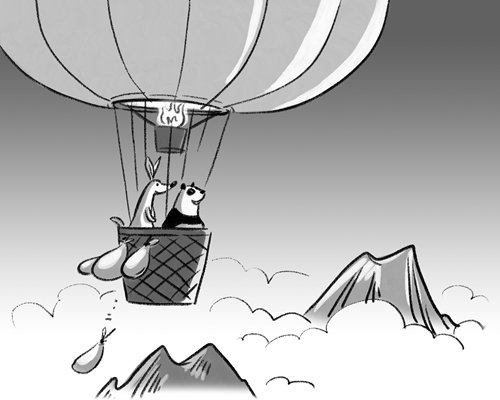
Illustration: Liu Rui/GT
Scott Morrison made his first foreign policy foray as Australia's new prime minister recently at the Asia Society in Sydney. While obfuscating some tough decisions such as the relocation of the Australian embassy in Israel to Jerusalem, Morrison's address manifestly spelt out three key words to guide his country's foreign policy during testing times for the world, namely "prosperity, security and unity".
Australia's economy has seen 27 years of uninterrupted growth, which has allowed Australia to enjoy its indisputable place in the world as an economic success. The British media outlet The Economist recently applauded the wonder down under, acknowledging that "Australia boasts the world's most successful economy".
A significant part of the booming Australian economy is ascribed to its ever-increasing trade and other business ties with China. Morrison has a deep understanding and unambiguous perception of this reality, and in his speech he championed "trade, tourism and educational exchanges" with China. He described Australia's relationship with China as "vitally important," saying that Australia is "committed to deepening [its] Comprehensive Strategic Partnership with China".
It was just announced Monday that Australian Foreign Minister Marise Payne is off to China on Thursday for a two-day trip to Beijing, the first by an Australian foreign minister in more than two and a half years, signaling a thaw in relations between China and Australia. Morrison seems to be taking concrete steps toward a resetting of China-Australia relations, which for the past 18 months have been going rapidly downhill with Canberra repeatedly making unsubstantiated allegations against Beijing and the Chinese community in Australia.
As Geoff Raby, Australia's former ambassador to China commented, such vilification has been "whipping up a climate of fear around China without serious challenge" and become unsettling for Australia's ethnic Chinese community and investors from China who have started to doubt the multicultural nature of the Australian society. Although to date bilateral trade has not been affected, an adverse political climate would dent people's confidence in making investment and trade decisions, even affecting tourists' choice of destination for the next holiday.
China has no interest in infringing on Australia's sovereignty, or to change the status quo of the country's traditional security and military ties with any other country. Unlike Washington which has been pressuring its allies to dissociate themselves from China politically and economically, Beijing never imposes its own geopolitical stance upon Australia, coercing it to take sides. In fact, Australia has been seeking a path of independence in foreign affairs and trade. Just a day before Morrison made the Asia Society speech, Australia ratified the Comprehensive and Progressive Agreement for Trans-Pacific Partnership, also known as TPP-11, striding onto a road away from an increasingly protectionist and unilateralist America.
Morrison is right to say Australia aims to maintain and develop constructive and proactive international relations regardless of "differences in how we see the world and run our respective societies". There is a Confucian wisdom in his remarks - to seek harmony rather than uniformity in the multilateral world order.
In the context of the intensified trade war launched recklessly by the US against China, countries particularly middle powers such as Australia need their political and economic wisdom to navigate the chartless stormy ocean of uncertainties. Morrison also talked about strengthening ties with the US, India, Japan, Indonesia, ASEAN and the Pacific countries. China welcomes a harmonious and multipolar world. The international community does have a shared future, and unity rather than confrontation is the cornerstone of a promising prospect for mankind.
Morrison said in his speech that China "is changing the balance of power". As China rises as the world's second biggest economy, Australia needs to accept and adapt to this new development. Nobody can bury the head in the sand to ignore the presence of China; nobody can realistically force China out of the international arena.
Morrison said he looks forward to meeting with Chinese leaders in the forthcoming G20 and APEC summits. We hope he is sincere and genuinely aims at a thaw in Australia's relations with China. China is not a card to be played to make partisan gains. It is in the long-term interest of both countries to achieve a win-win outcome in bilateral relations.
The author is a professor and director of Australian Studies Centre, East China Normal University. opinion@globaltimes.com.cn
